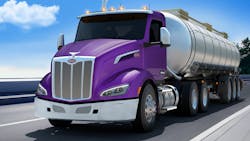Paccar Inc. is switching gears on the heels of several notable product launches and will spend less on equipment and plants next year, instead boosting their investments in future products and services.
Along with their third-quarter results – which showed net income of $378 million on sales of more than $4.7 billion, a drop of 2% and growth of 4%, respectively, from the same period of 2020 – Paccar CEO Preston Feight and CFO Harrie Schippers on Oct. 26 said the company during the quarter started production of its Peterbilt 579 and Kenworth T680 trucks – which are 7% more fuel-efficient than their predecessors – and this month began cranking out in Europe a new series of DAF trucks that has generated more than 10,000 orders since June. Getting those projects off the ground contributed to the quarter’s drop in profits.
With those production launches – part of more than $7 billion Paccar has spent in the past decade on new plants, products and technologies – the company will spend less on major projects: Feight and Schippers have trimmed their 2021 capex forecast to a range of $525 million to $550 million from $550 million to $600 million this summer. For 2022, they expect capex will be between $425 million and $475 million.
Something of a flip side to that: Paccar’s research and development spending will grow next year to a range of $350 million to $400 million. For 2021, that budget line item is now expected to be around $325 million, which is down from a forecast of $340 million to $360 million in July. Those investments are focused on future diesel and zero-emission powertrains, driver assistance systems and its autonomous driving platform, among other things. The last of those is being tested in Texas with Aurora and FedEx, and Feight said it is being developed to also partner with other companies’ driver systems.
“That’s why we’re making those big investments,” Feight said, later adding that autonomous systems provide “a great opportunity for Paccar to grow in the world.”
On their call with analysts and investors, the Paccar executives also said they have been able to offset increases in input costs with price hikes that averaged 4% during the quarter, a pace they expect to continue and maybe even lift in 2022. The company’s parts division, which posted record revenues and pre-tax profits in the third quarter, has been able to hike prices by about 5% of late.
Feight also told the investment community Paccar has seen various supply chain problems ease slightly of late – Larry Culp, his counterpart at General Electric, earlier on Oct. 26 said his team isn’t yet noticing any letups on that front – and is expecting gradual and steady improvements that will take a lot of 2022 to unfold.
Shares of Paccar (Ticker: PCAR) closed Oct. 26 trading at nearly $87. They have fallen about 5% over the past six months.
About the Author
Geert De Lombaerde
Senior Editor
A native of Belgium, Geert De Lombaerde has been in business journalism since the mid-1990s and writes about public companies, markets and economic trends for Endeavor Business Media publications, focusing on IndustryWeek, FleetOwner, Oil & Gas Journal, T&D World and Healthcare Innovation. He also curates the twice-monthly Market Moves Strategy newsletter that showcases Endeavor stories on strategy, leadership and investment and contributes to other Market Moves newsletters.
With a degree in journalism from the University of Missouri, he began his reporting career at the Business Courier in Cincinnati in 1997, initially covering retail and the courts before shifting to banking, insurance and investing. He later was managing editor and editor of the Nashville Business Journal before being named editor of the Nashville Post in early 2008. He led a team that helped grow the Post's online traffic more than fivefold before joining Endeavor in September 2021.
